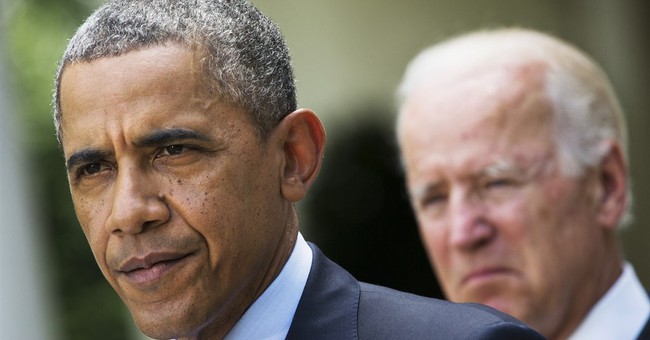
When, in 2002, then-Illinois State Sen. Obama gave his famous anti-Iraq War speech, he argued that America had no business in this "dumb" war. Period.
Obama considered Iraq a blunder of epic proportions, a misadventure totally devoid of any national security interest. Obama never doubted the assumption given to then-President George W. Bush by all 16 of our intelligence agencies: that Saddam Hussein possessed stockpiles of WMD, specifically chemical and biological weapons. CIA director George Tenet, who served under Obama's predecessors -- Presidents George W. Bush and Bill Clinton -- called the intelligence behind this assumption a "slam dunk."
Nor did Obama question our intel behind the other charges against the dictator: that Saddam Hussein was paying $25,000 to families of homicide bombers; that he was stealing from the oil-for-food program; that he was shooting at the American and British plane patrolling the southern and northern no-fly zones; that he had attempted to assassinate President George H.W. Bush; that he'd used chemical weapons on his enemies and on his own people; and that during his nearly 25 years of power, he had murdered at least as many as 300,000 Iraqis.
As Obama put it in 2002: "I suffer no illusions about Saddam Hussein. He is a brutal man. A ruthless man. A man who butchers his own people to secure his own power. He has repeatedly defied UN resolutions, thwarted UN inspection teams, developed chemical and biological weapons and coveted nuclear capacity. He's a bad guy. The world, and the Iraqi people, would be better off without him."
In 2007, Obama conceded that pulling out carried risks, but the "risks are even greater" if we stay: "There's no doubt there are risks of increased bloodshed in Iraq without a continuing U.S. presence there. ... It is my assessment that those risks are even greater if we continue to occupy Iraq and serve as a magnet for not only terrorist activity but also irresponsible behavior by Iraqi factions." In 2008, the then-U.S. Sen. Obama ran to get us out of the Iraq war.
In December 2011, we pulled out -- with no stay-behind force. Obama said: "We're leaving behind a sovereign, stable and self-reliant Iraq, with a representative government that was elected by its people. We're building a new partnership between our nations." When the last of the troops left, Obama called Iraq "self-reliant and democratic."
Now, however, with ISIS slaughtering religious and ethnic minorities, Obama has ordered air strikes "to prevent a potential act of genocide." Are these air strikes for humanitarian reasons? But Obama, through his press secretary, has also justified the airstrikes on grounds of "national security."
If it's national security, why didn't national security compel us to leave a stay-behind force? If it's for humanitarian reasons, why didn't Obama support the removal -- on humanitarian grounds alone -- of a murderous dictator who may have slaughtered as many as a million of his own people?
Obama now claims that what the military calls the "Obama bugout" was actually Iraq's idea, not his. Iraq, according to the President, refused to negotiate a reasonable status of forces agreement. So, Obama now says, we had no choice but to leave.
"Do you wish you had left a residual force in Iraq?" asked a reporter recently. "Any regrets about that decision in 2011?" Obama quickly denied any fault: "Keep in mind, that wasn't a decision made by me. That was a decision made by the Iraqi government." A few days ago, another reporter asked the same question. Obama elaborated: "What I just find interesting is the degree to which this issue keeps on coming up, as if this was my decision (emphasis added). Under the previous administration, we had turned over the country to a sovereign, democratically elected Iraqi government. So let's just be clear: The reason that we did not have a follow-on force in Iraq was because the Iraqis -- a majority of Iraqis -- did not want U.S. troops there, and politically they could not pass the kind of laws that would be required to protect our troops in Iraq. So that entire analysis is bogus and is wrong."
Bogus? Was there any doubt about Obama's intentions, regardless of the consequences? On July 3, 2008 Obama said, "My first day in office, I will bring the Joint Chiefs of Staff in, and I will give them a new mission, and that is to end this war." What about a stay-behind force? He called it "a strategic error for us to maintain a long-term occupation in Iraq."
Well, now we're back in Iraq, this time with "advisors" and airstrikes for both humanitarian and national security reasons. Whatever the merits of the long, costly Iraq war, President Bush did have an end game, even if our war-weary country was too impatient to see it through. When the Iraqis can stand up, Bush said repeatedly, we will stand down.
What's Obama's end game?

No comments:
Post a Comment